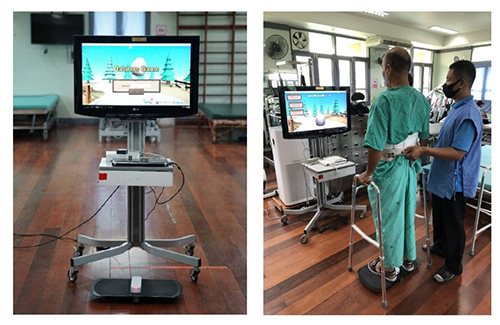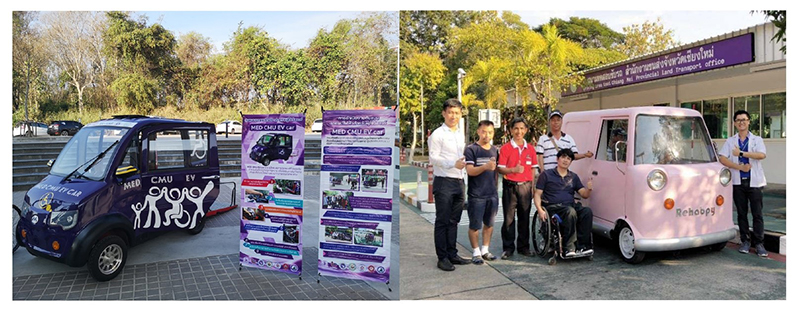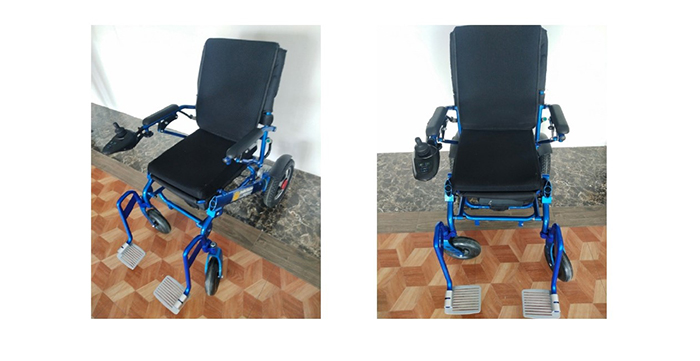CMU Aiyara assisting medical personnel with patients
Necessity is the mother of inventions, and the Covid-19 pandemic has created situations where invention has become an urgent necessity. Chiang Mai University's Faculty of Medicine, working on the frontlines of the pandemic, has taken on the pivotal role of responding to the current medical needs of Chiang Mai.
To that end, CMU Aiyara, a robotic prototype, can move around distributing water, food, medicine, and clothes to Covid-19 patients, significantly reducing physical contact between patients and medical caregivers. CMU Aiyara can also measure temperatures and collect items such as used clothes and garbage, facilitating the care of patients in a safe and efficient manner.
Aiyara in Thai translates to elephant, an apt name for such a resilient, focused, and powerful tool, jointly developed by the Faculties of Medicine and Engineering.
From Medical Doctor to Innovator
Indeed, responding to society's increasingly complex needs demands cooperation between individual specialisations to provide solutions, driving education and the advancement of knowledge.
MED CMU Health Innovation Center (MedChic) was formed to meet and anticipate such needs.
MedChic: Taking the step beyond specialised knowledge towards innovation
The answer to the question whether medical doctors can become innovators is a firm yes.
Today's medical challenges are growing in complexity in reflection of a changing world. Medical doctors know that it is no longer enough to fix a medical problem; a true physician must also consider the patients' overall wellbeing.
Numerous members of the Faculty of Medicine have been exploring multidisciplinary studies. MedChic draws these like-minded physicians to work together towards four clear strategic areas:
• Medical Devices,
• Natural Products,
• Health Technology and
• Suandok Medical Innovation District
The goal is to offer consultancy services to businesses and innovators looking to develop medical technology and innovative solutions, to produce high-value prototypes to be used in future commercial projects.
"Today, it is now widely accepted that medical doctors do not necessarily have to focus solely on medicine," explained Associate Professor Dr. Sirianong Namwongprom, Director of MedChic, Chiang Mai University. "There are a variety of fields which enhance the medical field, whether it is engineering, computer science, or business studies and these fields of knowledge can all be drawn upon to help patients in need. MedChic creates an opportunity for a new generation of physicians who may have ideas outside traditional frameworks, who wish to innovate and work on projects with us. That is not to say that our faculty no longer focuses on creating doctors with the purpose of healing, but the faculty now has a centre to incubate and develop creativity and innovation in support of that aim."
Associate Professor Dr. Sirianong Namwongprom, Director of MedChic, Chiang Mai University
MedChic supports innovation that responds to particular areas or groups of people. For example, medical tools can be developed using a team of diverse medical consultants working together to further individual or collective fields of knowledge and evaluate various ideas and tools.
At times a medical product will require market research or a theory may need practical testing. Therefore, a team of lawyers also works closely with MedChic to ensure intellectual property rights and any other legal issues associated with medical tool development are addressed to aid the path towards future commercial use.
Using Innovation to return happiness to the elderly and disabled
Innovation is often a by-product of problems. Thailand's private and public hospitals are rapidly providing high-quality medical equipment to check, analyze, and heal patients, leading to the rapid growth of the medical equipment industry. However, Thai businesses are still limited by technology development and innovation, relying on imported products that are currently still more cost-effective than developing them within Thailand. There is also a lingering hesitancy in consumer confidence regarding products developed in Thailand.
In 2019 and 2021, MedChic received funding from the Department of Industrial Promotion to create and innovate medical tools and knowledge for the elderly and disabled, including;
1. Electric hospital beds,
2. Lateral turning medical beds,
3. Foldable electric wheelchairs,
4. EV Cars,
5. Innovative games for balance,
6. Cushions for the disabled,
7. Standard wheelchairs,
8. Training wheels,
9. Adjustable height beds,
10. Large exercise beds,
11. Small exercise beds,
All must meet the real needs of the elderly and the disabled.
An important issue to highlight is that these innovations have been developed and designed in response to real problems and challenges reported by medical doctors and those working in the medical field to meet the real needs of patients.
For example, the adjustable-height bed helps patients with lower-body paralysis to practice standing and walking. Moreover, it can be developed at a reasonable price, and is suitable for hospitals and other centres with similar patients. Lightweight wheelchairs, innovative balancing equipment, and lateral turning medical beds are just some of the innovations which can be developed into industrial prototypes to be patented and taken to the market at large.
MedChic's "Rehabpy” brand exists to commercialise these innovative new Thai developed products designed to increase the quality of life of the elderly and disabled. Focusing on real problems and needs and incorporating patient feedback, the quality of Rehabpy products can be guaranteed.

Adjustable height beds

Innovative balancing games

Electric vehicles for wheelchair users

Electric foldable wheelchairs
Suan Dok Innovation for world change
The Suan Dok area is home to Maharaj Hospital Chiang Mai and the Faculties of Medicine and Associated Medical Science, Chiang Mai University. Therefore, it is an ideal location for an Innovation District that aims to attract medical and business minds to create a cluster to develop creativity and innovation.
In August 2019, Chiang Mai University's Faculty of Medicine and the NIA signed an agreement to jointly develop the innovation district to create a cooperation network between government, academic, public, and SMEs/Start-up sectors, potentially leading to significant change.
To this end, activities such as the "MedChic Innovation Day 2021" and the "SMID Health Hackathon 2021: In the Age of Health Digitisation" have seen many interested groups working together to generate ideas and find solutions to current problems. These activities are designed to inspire and offer new perspectives to medical professionals.
"We are creating new outlooks for medical professionals," said Associate Professor Dr. Sirianong, explaining, "we are now viewing medicine through the perspectives of the patient, adjusting ideas in the hope of instilling a deep understanding within the organisation that an idea or concept, together with some daring, can create the drive that is needed for it to be developed into success. Of course, success is not immediate and can take years to achieve, but every failure, every setback, is a lesson from which we continue to learn and improve. So it is with great pride when we reach our goal."
CMU Aiyara is just one of the many examples of innovation being developed within MedChic to open up endless possibilities for the medical field.